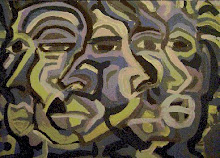 Thank you all for responding.
Thank you all for responding.My thinking is that whether one succeeds or fails, the choice is up to the individual.
I don't understand why some who dress as gangsters fail to see why society treats them as anything other than a criminal. In the photo above, these kids choose to dress in the most intimidating manner that they could imagine.
Not just gangster,
but as a "Black Gangster".
running mom - "Our perception of what..."
- Our perception and what one actually identifies as are often at odds. An inner-city Black kid wearing Phat Farm and Sean Jean and identifying as "Preppy" would be seen by real Preps, seeing the same kids, as being ghetto kids in hip-hop fashion.
Would any of the first three photos in this post be seen as dressing Black? Most would say that only the first of the three is "dressing Black". If we switch the races in three photos, which would be seen as "normal"?
- Are your cousins identifying as both or are they influenced by both? Which has a greater impact on their socio-economic status? Or does it matter?
 cnulan - "confidence, self-assurance, arrogance..."
cnulan - "confidence, self-assurance, arrogance..."Well... that's actually what I'm trying to say. One's psychological state and frame of reference has more to do with whether one succeeds or fails than do others' views. Does your familiarity with more than one group or economic level add to your lack of fear in a possible hostile environment?
"Oh, and let..."
Yes, this small Texas town is still stuck in the field/house, slave/master, light/dark, etc mentality. There is a lot of money in the area but very little wealth. There is a lot of tradition but very little progress.
 Angry African - "Yet, again..." I had a Dutch friend who had to leave S.A. after Apartheid. His Black friends had to spirit his family out of the country to avoid the threatened assaults and killings.
Angry African - "Yet, again..." I had a Dutch friend who had to leave S.A. after Apartheid. His Black friends had to spirit his family out of the country to avoid the threatened assaults and killings.In reading your posts, Dutch (Anglo-African to be P.C.) just comes through.
 brohammas - "Parenting and environment..." Agreed.
brohammas - "Parenting and environment..." Agreed.-"I have known kids..." These are the kids who will grow up and say, "It's because I'm Black", after they've failed to get a job, promotion, or opportunity. I'm not sure whether many of these parents recognize the subtle differences in speech, dress or mannerisms. (Like when someone over-articulates every syllable of every word when trying to fit in - in a perceived up-scale environment. One group of people thinks that it sounds up-scale - while the perceived up-scale group notices the affectation.)
 sjp - But how do we translate this dismissal (or is there even a need) of other's prejudices to a broader audience? How do we translate these advantages (both real and imagined) into being seen as just giving someone a head start and not as the opponents already having crossed the finish line?
sjp - But how do we translate this dismissal (or is there even a need) of other's prejudices to a broader audience? How do we translate these advantages (both real and imagined) into being seen as just giving someone a head start and not as the opponents already having crossed the finish line?














1 comment:
Interesting question. Not sure I have an answer for you. But, I do think that the election has not only open the doors for real discussions about race but also has caused many to confront their own race issues. No longer can folk hide behind the "but, I didn't know" mantra or insist that racial disharmony actually exists. The racial divide was truly revealed and now there must be a bridge must be built in order to cross over.
I learned many years ago, that in order for a "group" to truly work together that it is necessary for that "group" to go through a crisis. Certainly, there have been other racial-type crises of note in our history - but none which required its entire citizenry to really deal with race. I think the 2008 election is our crisis and how we deal with it as a nation may very well answer the question of how our prejudices are translated to the entire audience. Only time will tell.
Post a Comment